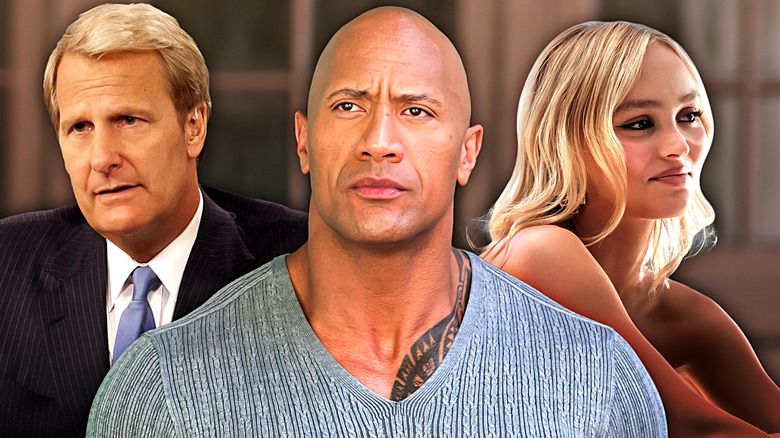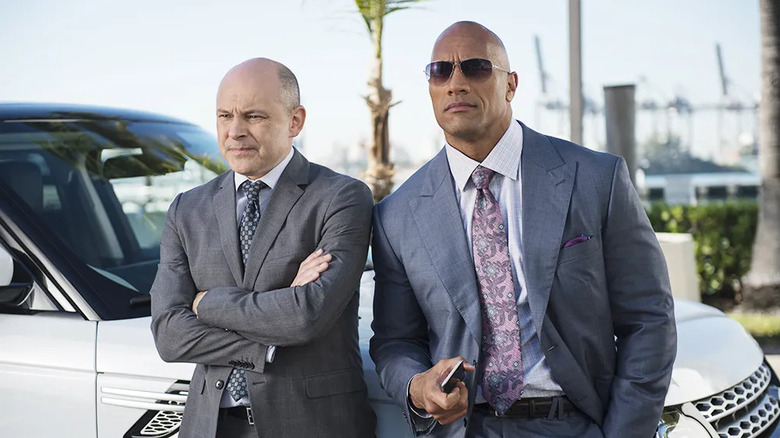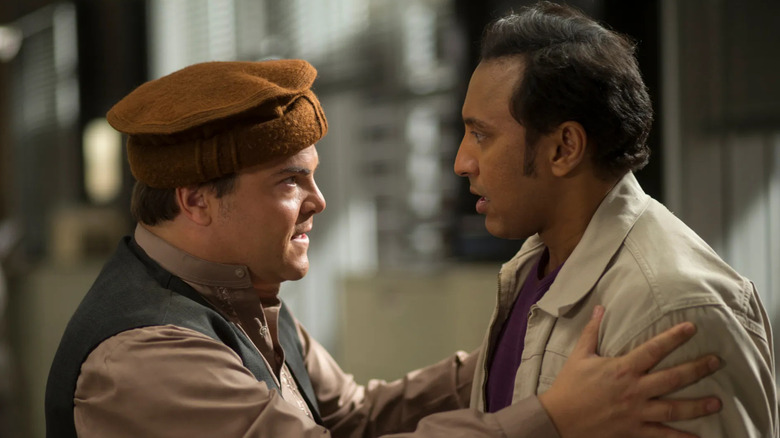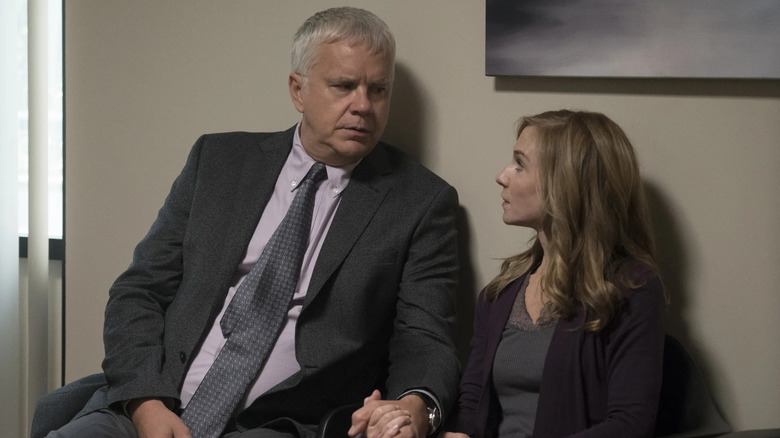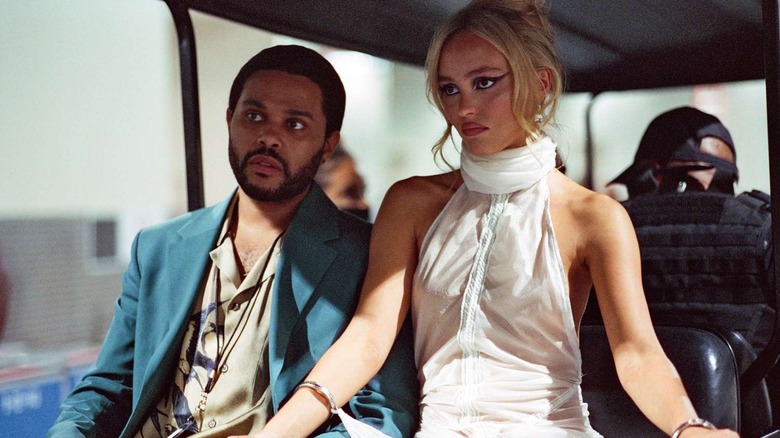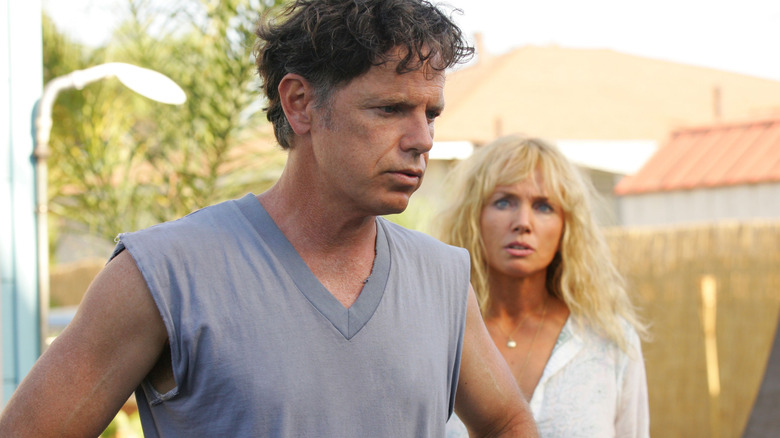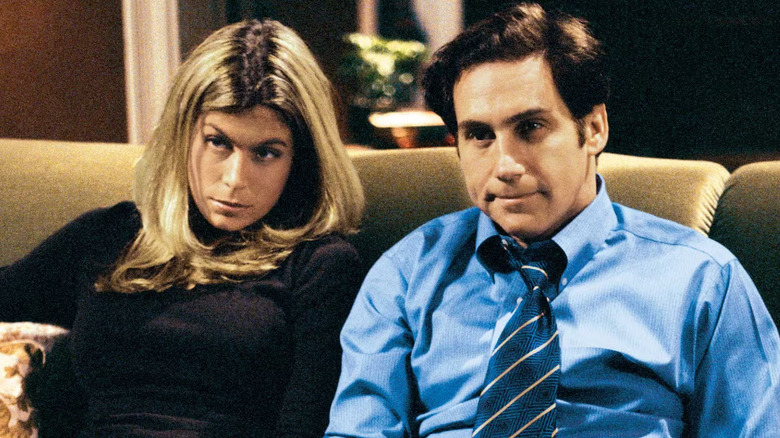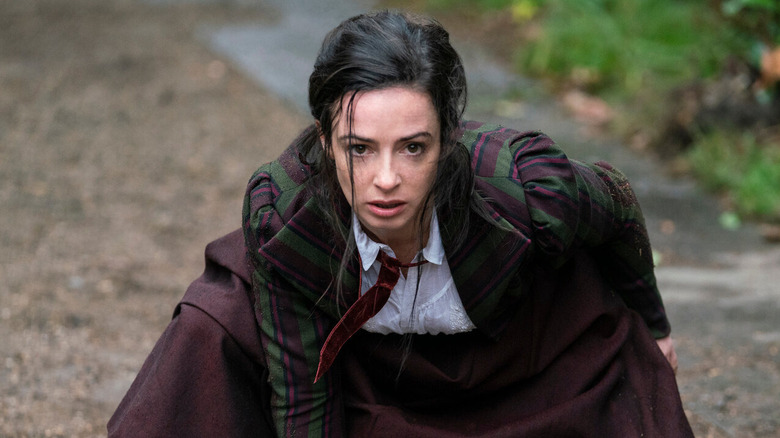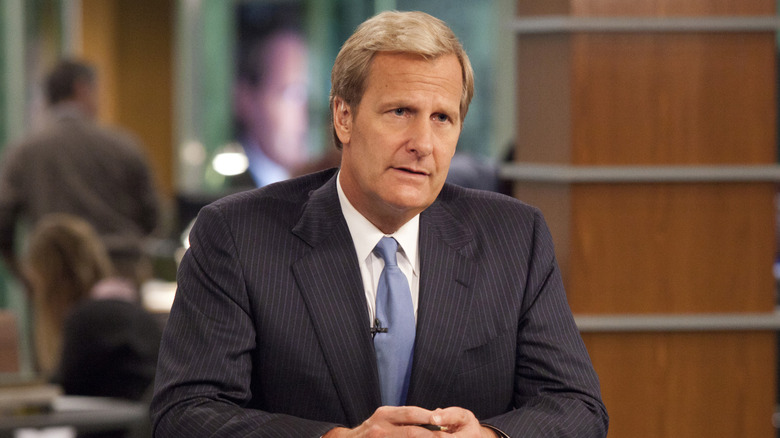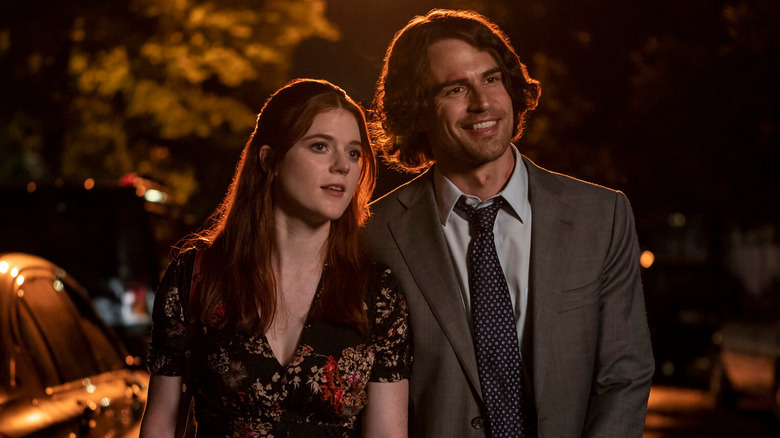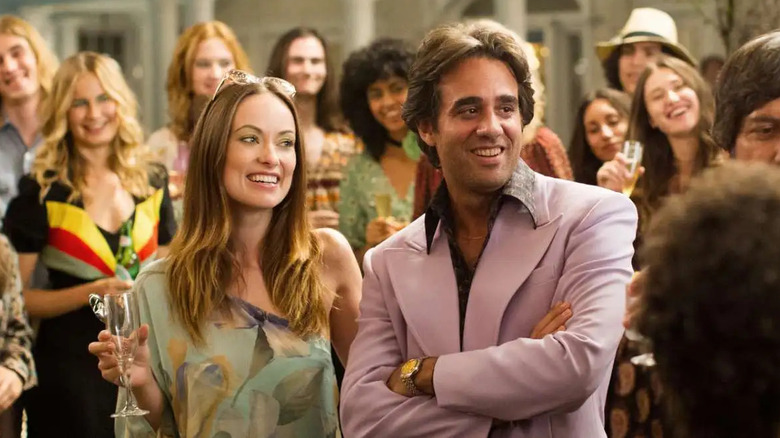The 10 Worst HBO Shows Ever
Long considered the gold standard of television, HBO continues to dominate the small screen with broadcast hits and streaming successes (via the platform Max). In the 2020s alone, it's produced a range of shows that mostly define what audiences expect from modern TV. Just as every crime drama has aspired to be "The Wire" or "The Sopranos" since the early 2000s, now every corporate thriller wants to be "Succession," every teen drama "Euphoria," and every fantasy "Game of Thrones." Of course, not every one of these aspiring shows can reach the high bar HBO has set — and that includes its own series.
Indeed, HBO has developed its fair share of duds in the past. Sometimes, it seems as though they desired to repeat the success of previous triumphs like "Sex and the City" or "Veep"; others might have gotten too swept up in the ambitious vision of once-reliable artists like Sam Levinson or Alan Ball — or conversely, failed to give A-list talent like Martin Scorsese room to do what they do best. Whatever the case, you certainly won't want to add any of the 10 worst HBO shows ever to your watch list (if you could even find them anymore, that is).
Ballers
In its freshman marketing run, "Ballers" declared itself to be about three things on the surface — football, God, and family. Underneath all of that, these themes were wrapped up in a story that explores the nature of redemption and, more importantly, reinvention. It's chilling to look back on now, as "Ballers" arguably wound up helping to reinvent its star athlete for the worst seasons of his career.
Dwayne Johnson executive produced and starred on the HBO sports drama, which premiered on HBO in the summer of 2015. At the time, he had arguably succeeded in becoming Hollywood's most bankable blockbuster star, headlining $100 million+ budget films like "G.I. Joe: Retaliation," "Hercules," and "San Andreas" after breaking out of the "Fast and Furious" franchise. But while Johnson's films got bigger and bigger, the characters he played continued to get flatter and flatter, each one starting to resemble a flattering portrait of the actor's charisma and personal moral values.
We mention all this because "Ballers" – a shrewd mix of "Entourage" and "Friday Night Lights" in which the actor plays a crusading financial manager for NFL players — suffers one of the steepest declines an HBO series has suffered once it starts playing into Johnson's safe and seemingly self-aggrandizing career trend. By the time the tragic legend of his Spencer Strasmore comes to a close, there hasn't been much tragedy or legend for some time — only practiced speeches and smiles.
The show as a whole has a rigid "party on Saturday, church on Sunday, work on Monday" structure that runs counter to the psychological complexity and transgressiveness HBO is supposed to stand for. Given that the show ran for five seasons, found fans among U.S. presidential candidates, and helped kickstart John David Washington's acting career, it's probably the most successful show included on this list. Apart from being crowd-pleasing gridiron comfort food, however, "Ballers" was far from a touchdown, and arguably helped cement the most disappointing era of The Rock's career.
The Brink
Speaking of talented and iconic actors in disappointing eras of their careers, here's Jack Black. Before subjecting us to whatever the hell "A Minecraft Movie" is, the "School of Rock" star had taken part in a number of daring, underrated projects that are well worth your time. On paper, "The Brink" absolutely could have been one such project as well. Instead, it was a nuclear-level misfire.
Black stars opposite fellow comic legend Tim Robbins on the bold but burdensome HBO satire, playing against type as a brutish U.S. Foreign Service officer sent to Islamabad, Pakistan, during a period of intense civil unrest. Robbins, meanwhile, plays the U.S. Secretary of State who, between bouts of weird sex stuff, finds time to run operations against a terror cell gaining traction in the city. Though its cartoonishly unflattering depiction of politicians is far from novel (the series premiered three years after HBO debuted its acclaimed political satire "VEEP" and overall was often regarded as a pale imitation of Stanley Kubrick's almost identically themed "Dr. Strangelove"), "The Brink" seems to think satire stops there.
It has relatively little and absolutely nothing new or insightful to say about the relationship between U.S. foreign influence and terrorism, why war escalates to such threatening levels, or how incompetent people manage to become the most powerful individuals in the world. The show strangely depicts its characters' childish behavior as the problem itself, rather than a symptom of something more compelling and tangible. As such, watching it becomes a chore that could only possibly be worthwhile as homework for the self-important. And if all that weren't enough — the jokes just aren't funny. Despite being initially renewed for a second season, HBO reversed course and canceled "The Brink" after season 1.
Here and Now
Unfortunately, "The Brink" isn't the only HBO series to misuse Tim Robbins. After delivering HBO back-to-back hits with the groundbreaking family drama "Six Feet Under" and (to a somewhat lesser extent) the vampire thriller "True Blood," writer-producer Alan Ball returned to the network in 2018 with "Here and Now," an ambitious drama overtly written for a post-2016 election America.
The series was created with the social consciousness necessary to examine where exactly the country was after the inauguration of Donald Trump, specifically in terms of the nation's stark divide between red and blue states, with a heightened sense of danger for most marginalized groups and a limp desperation from white liberals to show their solidarity without interrogating their own failings. Politics aside, this framework and perspective have so much conflict, complexity, and real-life angst that it should have easily generated compelling drama — that is, if Ball and Co. weren't so distracted by laborious attempts to complicate the narrative more than necessary.
"Here and Now" follows the adult adoptive siblings of color of a white family, whose lives are so contrived and unintentionally caricatured that it borders on self-satire — and that's before the show tries to throw a baffling supernatural twist into the mix. It would be largely inaccurate to say that Ball falls into the same trap of empty identity politics as his well-meaning protagonists, but in failing to say anything coherent that could drive audiences toward a fuller understanding of the world, the end result of "Here and Now" is just as shallow.
The Idol
This list isn't ranked — if it were, it'd be hard to select anything other than "The Idol" as the worst of the worst. The infamous HBO music industry tragedy was created by Sam Levinson, the filmmaker largely responsible for the similarly controversial but unquestionably lauded teen drama "Euphoria," which launched Zendaya's career and earned HBO another culturally ubiquitous, medium-defining series to boast. When it was announced that Levinson would be partnering with Abel Tesfaye — aka the world-renowned pop musician The Weeknd — on an edgy drama about a Britney Spears-esque popstar (played by Lily-Rose Depp), the buzz was understandably (and perhaps even unfairly) loud. The intrigue surrounding the series got more intense when reports of a tense behind-the-scenes creative split and a massive overhaul of the entire series hit the media.
Ultimately, however, "The Idol" is far less interesting or exciting than this build-up would have suggested, and even less appealing on a narrative level. Depp's tortured teen idol shoots for unknowable and ends up being frustratingly vague — not even a blank canvas, but one caked with so many bizarre and needlessly conflicting traits, experiences, and decisions, that there's no room for the viewer to understand who she might be beneath the surface. She's whoever she needs to be at any given moment for Levinson, Tesfaye, and co-creator Reza Fahim to pretend at transgression as they rehash harsh realities about music and entertainment that have been run into the ground for decades now — only with a distinctly cynical and wholly unattractive bitterness that reduces the glossy project intellectually to something between an unflattering tabloid profile and a social media crash-out. "The Idol" ended after one season, though debate continues to rage if it was on HBO's terms or Levinson's.
John from Cincinnati
In contrast to "The Idol," "John from Cincinnati" may be the one show on this list that's actually worth giving a chance — even though it still isn't likely to land for you. Created by David Milch (the creator of HBO's wildly popular western epic "Deadwood") and novelist and professional surfer Kem Nunn, the 2007 series showed some promise during its first and final season that shouldn't be entirely dismissed, especially by those who may feel that TV is beginning to enter a period of creative stagnation.
"John from Cincinnati" is genuinely unlike anything you've ever seen on television. It revolves around the tragically dysfunctional Yost family, a dynasty of professional Californian surfers whose lives have unraveled as they sought to define the sport that defined them. There's self-centered and terminally naive Mitch (Bruce Greenwood), his guilt-ridden but hostile wife Cissy (Rebecca De Mornay), their emotionally derelict son Butchie (Brian Van Holt), and his own prodigious son Shaun (Greyson Fletcher). Their lives — and the lives of those in their tight-knit coastal community — are changed forever by a man named John (Austin Nichols), whose seemingly mystical abilities allow him to touch the minds of others directly.
That's about as simply and conventionally as we can describe the series, which is a major part of the problem. "John from Cincinnati" is doing so much and in such bizarre fashion that it's nearly impossible to settle into as one usually must to engage emotionally. It often feels like it was plotted as a drama, scripted as an absurd comedy, and shot like a reality TV show. Is it interesting, weird, and occasionally even brilliant? Maybe. Would that make it a good series overall? Sadly, no.
The Mind of the Married Man
As HBO was entering the new millennium, it enjoyed much of the success that would establish the network as the premiere destination for prestige TV. This was due in large part to the variety of high-quality programming offered, which as of 2001 included the gritty crime dramas "The Wire" and "The Sopranos," the sitcom "Curb Your Enthusiasm," the existential tragicomedy "Six Feet Under," and the culturally prevalent romantic comedy series "Sex and the City." The latter show was unique in that, as a story about the professional and personal lives of four women in New York, it confidently and successfully targeted a female audience. In a surprisingly cynical move, HBO surprisingly tried to repeat this success by remixing the format, setting, themes, and visual style of "Sex and the City" for its male audience. Thus, the network (unfortunately) took us inside "The Mind of the Married Man."
The series (which ran for just two seasons from 2001 to 2002) follows three young Chicago newspaper writers, one of whom is played by creator, showrunner, and occasional director Mike Binder. Ignoring that there were and are plenty of sitcoms out there about the personal and professional lives of dudes in cities, "The Mind of the Married Man" lacks the romance, sensitivity, introspection, and simple likability that makes "Sex and the City" enjoyable regardless of your gender. Some lines are funny enough on paper, but the tone is too muted and the writing too repressed and insecure that they almost never land. At times the show overall is so unfunny and predictable it feels like self-parody. "The Mind of the Married Man" is nearly impossible to track down these days, neither available to stream nor rent on VOD services.
The Nevers
We really, really want to like "The Nevers." A genre mash-up of Victorian period drama, superhero thriller, and extraterrestrial science fiction — who could possibly screw that up? Oh, right: Joss Whedon.
Getting the elephant in the room out of the way immediately, the series was developed by Whedon in the aftermath of the "Justice League" reshoots that would ultimately unravel his career and reputation as a safe, progressive, reliable collaborator, with troubling allegations of misconduct emerging from both the DC Comics film and his TV series "Buffy the Vampire Slayer." Given that most of the complaints came from women he had worked with and/or been personally involved with, and were additionally alleged to have been born of a sexist attitude on set, there's a deeply uncomfortable and unavoidable air you have to sit through when watching "The Nevers" — a show he created during this time for an ensemble of women.
Suffice it to say, though it wasn't necessarily surprising when Whedon mysteriously backed out of "The Nevers" ahead of its release (and was entirely ignored during its press run), his involvement with the series is still too noticeable, even just on a stylistic level.
This style — expectedly weightless, tropey, and comedically awkward — unfortunately permeates all episodes of the series, even those that weren't written during his time as showrunner. As a result, "The Nevers" is so dreadfully unspecial that, beyond the premise and the controversy, there's nothing about it worth discussing. In 2022, it was unceremoniously pulled from HBO's streaming platform Max, leaving its availability in question for the foreseeable future.
The Newsroom
We'll start here by copping to the undeniable — Aaron Sorkin is one of the most prolific, successful, and talented writers in the history of film and television. By 2012, he had already penned such TV classics as "Sports Night" and "The West Wing," as well as the acclaimed films "A Few Good Men," "The Social Network," and "Moneyball." However, thanks to NBC's "The West Wing," he earned a reputation for writing political dramas that were heavily steeped in a certain brand of idealism. In contrast to the aforementioned "Veep" and "The Brink," the politicians of "The West Wing" were educated, well-spoken, fearlessly diplomatic, and unflinching in their core values. He was lauded perhaps not for writing Washington political agents as they were, but for writing them as they should be. In this case, "The Newsroom" sees this reputation go straight to Sorkin's head.
The 2012 series — an hour-long dramedy about journalists, producers, and news anchors trying to restore objective truth to an industry overrun by sensationalism and partisanship — often feels like Sorkin playing Monday morning quarterback for the reporting of real-world events. Even setting aside what that says about real journalists (who were both rightly and wrongly criticized by the annoyingly sanctimonious and naive series), this format leaves Sorkin wide open to indulge his worst revisionist impulses that not only harm the series but actual discourse around the subjects he desires to confront.
For example, what good are his vague jabs at the financial interests of large media companies and the involvement of shady backers like the Koch Brothers when Sorkin himself hand-waves away any serious reckoning with this reality? He imagines elites who are so superhumanly "moral" (which is to say, in line with his own particular morality based entirely on accredited intellect and tactical politeness) that they show an unrealistic disregard for their own obscene wealth. Even Sorkin himself admits "The Newsroom" never fully worked — though we're hopeful the second Trump term won't inspire that long-threatened revival.
The Time Traveler's Wife
Warner Bros. has been correct twice now that "The Time Traveler's Wife" — Audrey Niffenegger's 2003 book which has been adapted and distributed by them twice — is a remarkably arresting romantic story spun out of an incredible premise. So why have they failed, twice, to turn it into a compelling piece of visual storytelling?
After the 2009 film adaptation (starring Rachel McAdams and Eric Bana) failed to make an impact, Warner Bros. and HBO took another swing in 2022 with a serialized adaptation written and developed by Steven Moffat. The series should have been a perfect fit for the "Sherlock" and "Doctor Who" scribe, as it follows the relationship between a man (Theo James) who has some sort of sickness that makes him time travel uncontrollably, and his one true love (Rose Leslie), whom he constantly leaves behind.
The trouble is that Moffat waters down this intriguing concept by emphasizing laboriously trite dialogue over visual spectacle or sequences of sci-fi tension — a choice perhaps meant to ground the series in its emotional reality, but sadly does little to support it. Warner Bros. seems to deeply regret venturing back to this timeline, having canceled "The Time Traveler's Wife" after one season and wiped it from Max entirely.
Vinyl
Arguably the most heartbreaking misstep included on this list, it's "Vinyl." The period dramedy about the record industry in the '70s (which aired in 2016) should have been HBO's next big show. The creative team consisted of Martin Scorsese, Terrence Winter of "The Sopranos" and "Boardwalk Empire," acclaimed entertainment journalist Rich Cohen, and Rolling Stones frontman Mick Jagger. The cast was incredible as well, including well-known talents like Bobby Cannavale, Ray Romano, and Olivia Wilde, along with rising stars Jack Quaid and Juno Temple, both of whom would shoot straight into the stratosphere in the years after the swift cancellation of "Vinyl."
"Vinyl" starts with enough energy to catch one's attention, but just keeps spinning and spinning as the episodes trudge on. It never gets annoyingly or offensively bad, but that quickly feels like a byproduct of the show's inability to elicit any emotion positive or negative with its on-track plotting (at least "The Idol" is sort of upsetting from time to time). Bad reviews coupled with poor ratings ultimately killed the show, making executives unenthusiastic about even attempting to course-correct their expensive A-list project for a second season. Like several other shows mentioned here, it was purged from the streaming service Max in 2022 — for a complete rundown of this disturbing phenomenon, check out our list here.
